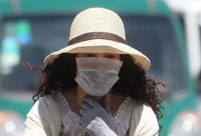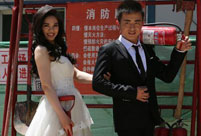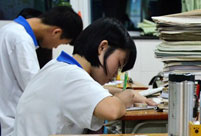 Luoyang aims to become 'Chinese Culture City'
Luoyang aims to become 'Chinese Culture City'
 Century-old jade disc found confirms ancient legend
Century-old jade disc found confirms ancient legend
 A serious mind behind Chinese leader
A serious mind behind Chinese leader
 Panda Cubs to Predict 2014 World Cup Winners
Panda Cubs to Predict 2014 World Cup Winners
 China Southern Airlines flight attendants win titles in service contest
China Southern Airlines flight attendants win titles in service contest
 Pupil's performance art persuades people to stop smoking
Pupil's performance art persuades people to stop smoking
 Nie Chenxi's clay tigers
Nie Chenxi's clay tigers
 Children's Day wishes
Children's Day wishes
 Chinese Kung Fu charms Silicon Valley
Chinese Kung Fu charms Silicon Valley
 Tranquil Yankou ancient town
Tranquil Yankou ancient town
-Hong Kong's international exchanges and its international influence have further expanded. Hong Kong's international exchanges have been broadened. By June 2013, Hong Kong, as a member of a Chinese government delegation or in other appropriate capacities, had participated in 41 events held by inter-governmental international organizations, and joined 37 inter-governmental international organizations whose membership is not limited to sovereign states. As a member of a Chinese government delegation or in other appropriate capacities, Hong Kong has attended more than 1,400 international meetings; using the name of "Hong Kong, China" it has attended more than 20,000 international meetings not limited to states. It has also hosted or co-hosted more than 1,000 international meetings. The HKSAR has visa waiver agreements with 42 countries, and 150 countries or regions provide visa-free entry or grant visas upon arrival to HKSAR passports holders. Hong Kong has civil air transport agreements, agreements on avoidance of double taxation, agreements on investment promotion and protection, and agreements on criminal justice assistance with many countries. The HKSAR government has economic and trade offices in 11 places, such as Geneva, London, Tokyo, New York and Berlin. Six international organizations, including the European Commission, have representative offices in Hong Kong.
Outstanding Hong Kong professionals have taken important positions in international organizations. Supported by the central government, Chan Fung Fu-chun, former director of health of the HKSAR, was elected director-general of the World Health Organization (WHO) in November 2006, and was reelected in May 2012. She is the first Chinese to head an inter-government international organization since the founding of the United Nations. Shun Chi-ming, director of the Hong Kong Observatory, was elected president of the Commission for Aeronautical Meteorology of the World Meteorological Organization in February 2010.
IV. Efforts Made by the Central Government to Ensure the Prosperity and Development of the HKSAR
The central government has always given high priority to Hong Kong's economic development and improvement of its people's livelihood, and fully supported it in meeting various difficulties and challenges. It gives full play to its role in adopting and executing the national development strategy, and actively promotes exchanges and cooperation between Hong Kong and the mainland, thus providing solid backing for Hong Kong's prosperity and stability.
1. Supporting the HKSAR in Defusing Risks and Meeting Challenges
-Supporting Hong Kong in the fight against the Asian financial crisis. In 1997, the Asian financial crisis broke out, and spread rapidly around the region. Hong Kong was attacked by international speculative forces, its financial market was volatile, its dollar pegged exchange rate system came under attack, and its financial system faced a grave threat. Given these circumstances, the central government solemnly announced that it would safeguard the stability and prosperity of the HKSAR at all costs, strongly support the HKSAR government in protecting the pegged exchange rate system, and not depreciate the RMB. With this support from the central government, the HKSAR government took swift measures that ensured the stability of its financial system and the Hong Kong society.
-Supporting Hong Kong in the fight against SARS. In the first half of 2003, the SARS epidemic hit Hong Kong. It not only posed a threat to the lives and health of the Hong Kong people, but also dealt a blow to Hong Kong's economy that had not recovered from the Asian financial crisis, resulting in deflation, market slump and a high unemployment rate of 8.7 percent. To ensure the safety of life of the Hong Kong people and help the Hong Kong economy climb out of recession, the central government promptly lent a helping hand. Although the mainland also needed medical supplies in the fight against SARS, the central government provided a large quantity of free medical supplies to Hong Kong. The Chinese leaders also went to the hardest-hit areas and hospitals of Hong Kong to inspect local conditions and console victims. On June 29, the mainland and Hong Kong signed the Mainland and Hong Kong Closer Economic Partnership Arrangement (CEPA), which outlines the steps that the mainland and Hong Kong should take in trade in goods and services, and trade and investment facilitation as well as the goals to be achieved. Later, the Individual Visit Scheme was introduced, allowing mainland residents to visit Hong Kong on their own. These measures helped Hong Kong overcome the SARS attack and boosted its economic growth.
-Supporting Hong Kong in the fight against the international financial crisis. When the international financial crisis broke out in the second half of 2008, the central government was highly concerned about its impact on Hong Kong. In December of that year, it introduced 14 policies to ensure economic and financial stability in Hong Kong. In January 2009, the central government launched more policies, including the signing of a RMB200 billion currency swap agreement by the People's Bank of China with the Hong Kong Monetary Authority. Later, when visiting Hong Kong, the Chinese leaders announced a number of policies to support Hong Kong's economic development, improve the local people's livelihood, and strengthen its exchanges and cooperation with the mainland. All these policies played a positive role in boosting confidence, strengthening capability to defuse risks and stimulating the economic recovery of Hong Kong.
 |  |
 Beijing strips off in summer
Beijing strips off in summer Heat waves hit China
Heat waves hit China Love at the construction site
Love at the construction site Graduation photos bring memories back to life
Graduation photos bring memories back to life Art school students present works in Nanjing
Art school students present works in Nanjing Xinjiang's first high-speed railway goes on trial run
Xinjiang's first high-speed railway goes on trial run 3D Sea-life Themed Art Garage unveiled in Zhengzhou
3D Sea-life Themed Art Garage unveiled in Zhengzhou
 Creative Photos go viral during graduation season
Creative Photos go viral during graduation season Students in last-minute effort for Gaokao
Students in last-minute effort for Gaokao Top 20 hottest women in the world in 2014
Top 20 hottest women in the world in 2014  Dali, an ideal summer vacation destination
Dali, an ideal summer vacation destination Xichan Temple's little monk hit the Internet
Xichan Temple's little monk hit the Internet Monologue of a modern dancer
Monologue of a modern dancer College girl proposes to boyfriend on Weibo
College girl proposes to boyfriend on Weibo Special operation members in counter-terrorism training
Special operation members in counter-terrorism trainingDay|Week|Month